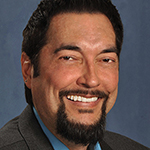Arlen & Charnin 60 Years Later

The new CD release by The Musical Theater Project and Harbinger Records, You Are Tomorrow, is a collection of new recordings by singer Sylvia McNair and pianist Kevin Cole—all of them songs by Harold Arlen and Martin Charnin written in the mid-1960s. Recently, Bill Rudman spoke with Sylvia and Kevin about this most unusual recording project.
Bill Rudman Sylvia, as you know, when I called you about doing this it was in part because for me, your 1996 Harold Arlen album with André Previn is the finest solo vocal performance of Arlen’s music ever.
Sylvia McNair Thanks, Bill! André, David Finck, and I had a lot of fun working on that project. André Previn knew Harold Arlen; they worked across from each other at the same large desk when they were both employed at one of the Hollywood film studios. André used to say that there wasn’t a note in Arlen that wasn’t essential. He had great stories about Arlen, and I think he enjoyed working on our project, which we titled Come Rain or Come Shine as much as I did.
Bill What draws you to Arlen?
Sylvia Soul.
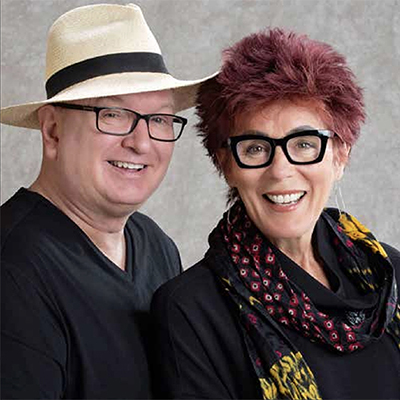
Kevin Cole & Sylvia McNair
Bill You and Kevin have enjoyed a mutual admiration society for some time now. What’s it based on?
Sylvia Kevin and I met in 2003 at the Ravinia Festival, near Chicago, doing a Gershwin program with the CSO [Chicago Symphony Orchestra]. It was pretty much love-at-first sound! He’s one of the most remarkable human beings I’ve ever met, and his skills at the piano are extraordinary. In two decades of collaboration, we’ve covered the waterfront: New York to LA, Vancouver to Florida, and plenty of places in between, doing repertoire from Jerome Kern, Cole Porter, the Gershwins, Arlen, Richard Rodgers, Stephen Sondheim, and Marvin Hamlisch… to Mr. Cole!
Bill Kevin, I feel as though you and I are brothers-in-Arlen because of our close friendship with his biographer, the late Edward Jablonski. It’s about time we got to do something together! Apart from your devotion to Sylvia, explain the Arlen-Kevin Cole bond.
Kevin Cole With a voice like Sylvia’s, you could make a listener fall in love with a sound and they wouldn’t care what she’s singing about. But what sets her apart from any vocalist I’ve ever worked with is her commitment to the words first and then the tune. Her clarity of thought behind the lyric is the backbone, and then she just layers her vocal prowess on top of that. I have to be in top form when I work with Sylvia because my arranging skills at the piano have to match her interpretation. It helps that we are great friends and have shared laughs and tears and many stories over the years. You bring all that to the keyboard.
Bill Explain the Arlen-Kevin Cole bond we hear in these recordings.
Kevin Although I’m known for my Gershwin interpretations, harmonically speaking, Gershwin and Arlen are kinfolk. Gershwin respected Arlen and called him “the most original of all of us.” I was 19 years old the first time I met Harold. Ed was anxious to have me play piano for him and he arranged for us to go to his apartment. I started out playing Gershwin, and then Arlen for Arlen. A bit daunting to say the least. I was playing one song to the next when I heard his phone ring. He answered it, but I couldn’t make out what he was saying. On the walk back to Jablonski’s home, Ed said, “Do you know who called Harold while you were playing? Irving Berlin. And do you know what Harold said to him? ‘Can’t talk now. Listening to someone who’s good!’ And he hung up. So you can tell your grandchildren Harold Arlen hung up on Irving Berlin to listen to you.” After that, whenever I played Arlen in concert I would send a recording to Ed and he’d spend an afternoon with Arlen listening to it. Harold would repeatedly ask Ed, “When’s that boy coming back? I love the way he plays my songs.”
Bill Sylvia, when the two of you were recording in Bloomington, you said something to me I’ll never forget. You called these songs “treacherous,” which I took to be a word in praise of this music. Explain.
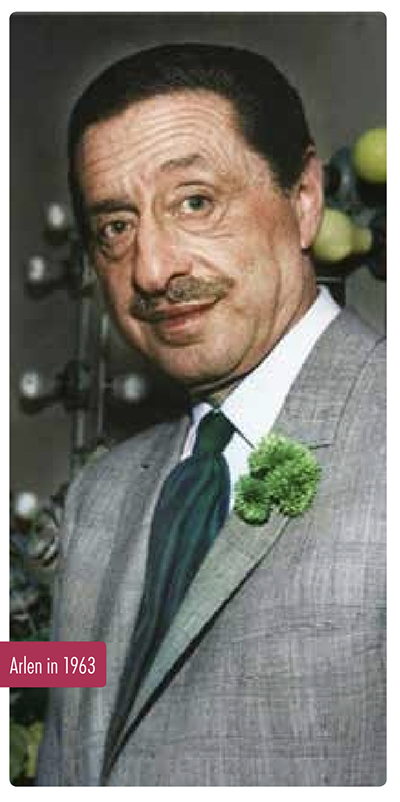
Harold Arlen
Sylvia They are treacherously difficult. The melodies don’t land where you think they will land, and the harmonies take some getting used to (a lot of getting used to). This seemed a bit like Arlen pushing the boundaries. They’re really not pop tunes, that’s for sure. And I needed every ounce of my two earned degrees in music to navigate them!
Bill I’m struck by the boldness of Arlen’s vision at 60. I mean, he’s still experimenting, and that can’t be said, for example, of Richard Rodgers or Cole Porter at that age.
Sylvia Life begins at 60, or at least that’s how it felt for me.
Kevin And for me, there’s no question Arlen was really venturing into a classical art
song mode. For example, “Summer in Brooklyn” and “Come On, Midnight” each sound like an American aria in blues. “Little Travelbug” and “The Brush- Off” have melody lines so difficult you have to have an exceptional ear and technique to sing them. Remember, this was the composer who truly broke the unwritten rule that a pop song had to be 32 measures long. Harold certainly did write 32-bar songs, but some of his most enduring titles have whatever number of measures are needed to complete the story he and his lyricist were telling.
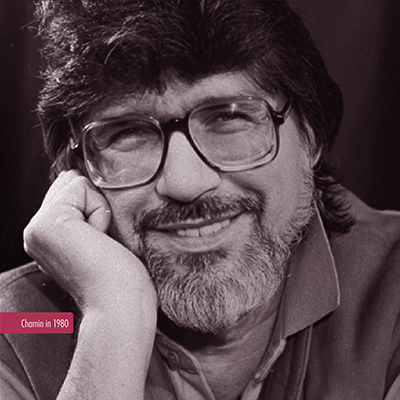
Martin Charnin
Bill Speaking of lyricists, Arlen, as you know, only worked with the best: Johnny Mercer, Yip Harburg, Teed Koehler, Dorothy Fields, Ira Gershwin. But by the mid-1960s, he set out to find younger wordsmiths. Carolyn Leigh and Dory Langdon Previn wrote a bit with him, but it was the partnership with Martin Charnin that lasted for three years, and Charnin was only 29 when they met. What do you find in Charnin’s early work that would explain why Arlen liked him so much?
Kevin I get the sense that Charnin knew he had big shoes to fill in sheer craftsmanship with the lyricists you just mentioned. I certainly can hear their influence in the songs on this album. For example, “I Could Be Good for You” has a Johnny Mercer feel, and “This Ol’ World” and “You’re Never Fully Dressed Without a Smile” have the playfulness of Yip Harburg. And Charnin sure knew a good title when he wrote one! He recycled Softly’s “You’re Never Fully Dressed Without a Smile” for Annie and gave us a virtually new lyric. But there are also lyrics in this collection that are extraordinarily moving.
Bill In addition to a full score for the unproduced Softly, the two of them wrote several dozen “independent songs.” Only one of them became popular: “That’s a Fine Kind o’ Freedom.” What about these songs worked against their popularity besides bad timing as rock came to the fore?
Sylvia I would guess it’s that they are difficult to sing and difficult to play. And of course there’s the question of keys. The original keys were awkward for me so we recorded almost everything in transpositions. No small feat given how complex the melodies and harmonies are.
Kevin Arlen’s piano-vocal charts look very basic at first glance. It’s on second glance you realize how he changes just one note within a chord with no warning and takes you to an unexpected place musically. Just when your ear thinks it knows what coming up next, he surprises you. You know, Harburg said Arlen almost seemed to be in a meditative state when he’d play a new melody. So in expanding the accompaniment, my job was to respect his intent and keep those subtle changes. Each song has a mood, and Harold’s road map told me if I was driving the piano into stormy weather or sunny skies. There’s also an undulating rhythm he had in his own playing (especially in his slower ballads) that I try to bring out. But on the up-tempo songs my sunny stride piano playing would have given him a chuckle.
Bill Thanks to Ed Jablonski, we actually have the professionally recorded demos of songs written for Softly performed in a studio session by Arlen and a trio led by him. Three of them are included here. Arlen’s singing—and remember, he made one of the first records of “Stormy Weather”—was, shall we say, idiosyncratic, but somehow unforgettable. Sylvia, how would you describe it?
Sylvia I would describe it as authentic, real, unstudied, honest, not laden with singing-teacher expectations. Sort of like speaking on pitch. And with a deep, deep feeling for jazz.
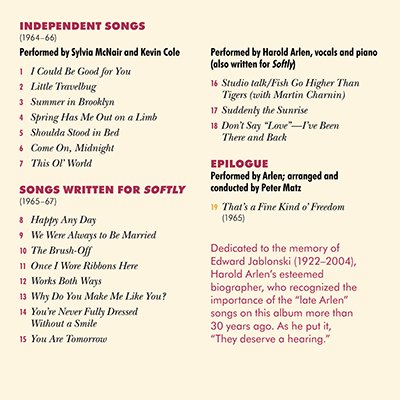
Bill Rudman is the co-founder with Ken Bloom of Harbinger Records. Bill is the founding artistic director of The Musical Theater Project (www.MusicalTheaterProject.org) and the producer and host of On the Aisle on SiriusXM on Broadway.
For additional information and to order the CD, visit https://musicaltheaterproject.org/new-from-harbinger-records/


